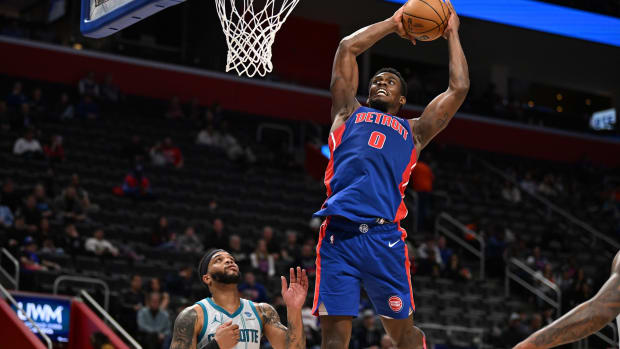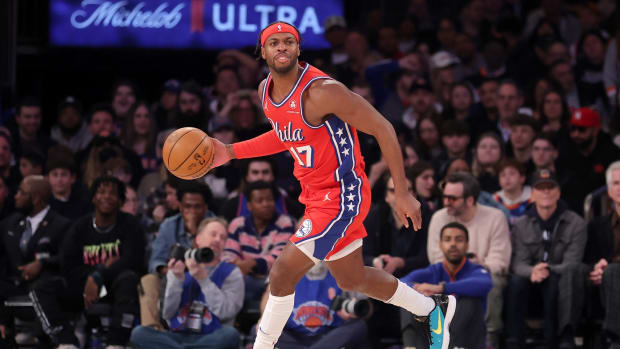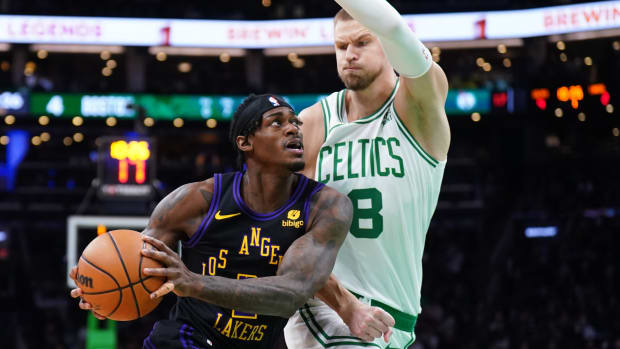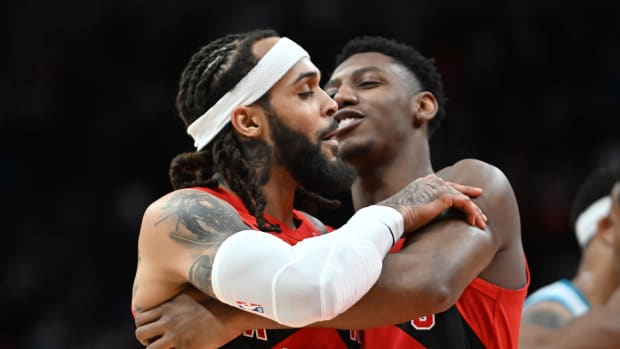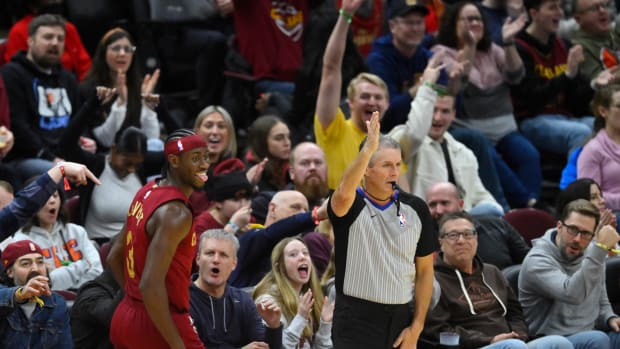The Endless Possibilities of Houston's All-World Playmaking
The Houston Rockets are learning. They’re still sorting out exactly what playing together will mean for James Harden and Chris Paul, who due to injury have only shared the court in four games to date. They’re clarifying how to best deploy newcomers P.J. Tucker and Luc Mbah a Moute, forwards who in tandem could unlock the flexibility of Houston’s roster. They’re testing the limits of Clint Capela, finding the right spots for Eric Gordon, and sussing out their options to maintain a top-10 defense. And all the while, they’re destroying everything in their path—wrecking competitive opponents with what amounts to a prototype.
Over the last two weeks alone, Houston has won five games—of a possible six—by 15 points or more. Most opponents never stood a chance. What resistance they could muster faded by the end of the first quarter, setting the stage for the Rockets to storm to a huge lead in the early second. Paul’s return to the lineup has had its intended effect: Houston, the only team in the league that can have an All-NBA point guard on the floor at all times, applies a constant pressure.
Keep LeBron James Away From the 76ers
Odds are good that on a given night, at least one of Harden or Paul will slice through the defense with razor precision. It takes such different mindsets and disciplines to stop them; those defenders best equipped to keep Harden from rolling downhill might not have an answer for Paul’s meandering drives, and vice versa. One guard collapses a defense with a direct shot to its gut and the other strains it by stretching it sideways. Their contrast elevates.
Just when a defense gets used to the rhythm of Harden’s lobs to Capela, the channel flips to the pick-and-pop game between Paul and Ryan Anderson. Already those two have an intuitive chemistry. Anderson is the sort of sweet-shooting big that Paul never had in Los Angeles, an easy pressure release with the range to punish straying defenders. Neither Anderson nor Paul has had much of a chance to feel out the other. Yet in their time together, Paul averages almost six assists to Anderson alone per 36 minutes—all on three-pointers.
Paul is just a natural. A left knee injury has disjointed his tenure as a Rocket, taking him out of the season’s natural flow. Still he’s taken to an entirely new offense and entirely new teammates by totaling 38 assists to just six turnovers. Mike D’Antoni can sleep easy knowing that no other player in the league assists more threes a game than his new point guard, and even easier knowing that Harden, his other point guard, comes closest.
Factor in Gordon and the Rockets' entire guard rotation snaps into place with intimidating clarity. The template is simple: Harden plays around 36 minutes, bouncing between both backcourt positions, while Paul and Gordon split the remaining 60 minutes between them. Gordon is clearly overqualified for the job of a third guard. He spaces the floor (though his 33.1% shooting from beyond the arc suggests even better days to come), he creates off the dribble, and he even played backup point guard in Paul's absence. Gordon, the third-best ball-handler on his own team, even runs a mean pick-and-roll in his own right:
After joining the Rockets last season, Gordon shot with newfound abandon, launching up jumpers from incredible distances without the slightest hesitation. Because of that, his every hesitation makes for a more credible threat. Defenses bite on a play like this one because a pull-up three taken six seconds into the shot clock is exactly the kind of shot Gordon and D'Antoni want:
Gordon has never looked quicker. His drives from the arc to the rim are a jolt, made all the more challenging to cover by the fact that opponents dedicate less attention and lesser defenders to Gordon than before. In a less crowded conference, his 20.9 points per game might even be generating some heat as a potential All-Star. He'll likely have to settle for being one of the most important reserves in the league—and a connective piece in many of Houston's best lineups.
Considering how much Houston wants the ball in the hands of Harden and Paul, Gordon is close to a best-case scenario as a secondary ball-handler. His presence alone can help keep Paul's minutes in check, an essential measure over the long regular season. And in terms of play style, Gordon can make a huge impact in a game with minimal time of possession. Most of his best plays are quick-hitting in a way that builds off of what the Rockets' playmakers do best. Harden has already connected with Gordon for 34 assists, yielding 90 total points. Paul's return to the lineup should build on that theme, filling Gordon's nights with even more open looks.
That the three guards have logged just five total minutes together thus far suggests Houston has layers yet unseen. There will be occasion for those lineups, just as there is a call for every variation we've seen thus far. The Rockets have builds within builds, a counter for most every occasion. When it's not Capela, it's Nene. When a matchup doesn't favor Anderson, it might Mbah a Moute. Players like Tucker and Trevor Ariza can slide around as D'Antoni sees fit, while the underlining all-world playmaking of Harden and Paul tie it all together.
This is a team that can sit two of its best players and still beat the Nuggets by 30. It's clear already that the formula behind the Rockets works. Less certain is the furthest extent of their reach, a world of possibility beyond blowout after blowout.































